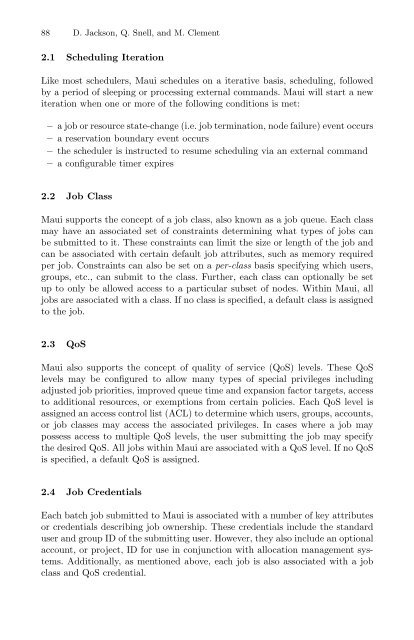LNCS 0558 -Job Scheduling Strategies for Parallel Processing
LNCS 0558 -Job Scheduling Strategies for Parallel Processing
LNCS 0558 -Job Scheduling Strategies for Parallel Processing
Create successful ePaper yourself
Turn your PDF publications into a flip-book with our unique Google optimized e-Paper software.
88 D. Jackson, Q. Snell, and M. Clement<br />
2.1 <strong>Scheduling</strong> Iteration<br />
Like most schedulers, Maui schedules on a iterative basis, scheduling, followed<br />
bya period of sleeping or processing external commands. Maui will start a new<br />
iteration when one or more of the following conditions is met:<br />
– a job or resource state-change (i.e. job termination, node failure) event occurs<br />
– a reservation boundaryevent occurs<br />
– the scheduler is instructed to resume scheduling via an external command<br />
– a configurable timer expires<br />
2.2 <strong>Job</strong> Class<br />
Maui supports the concept of a job class, also known as a job queue. Each class<br />
mayhave an associated set of constraints determining what types of jobs can<br />
be submitted to it. These constraints can limit the size or length of the job and<br />
can be associated with certain default job attributes, such as memoryrequired<br />
per job. Constraints can also be set on a per-class basis specifying which users,<br />
groups, etc., can submit to the class. Further, each class can optionallybe set<br />
up to onlybe allowed access to a particular subset of nodes. Within Maui, all<br />
jobs are associated with a class. If no class is specified, a default class is assigned<br />
to the job.<br />
2.3 QoS<br />
Maui also supports the concept of qualityof service (QoS) levels. These QoS<br />
levels maybe configured to allow manytypes of special privileges including<br />
adjusted job priorities, improved queue time and expansion factor targets, access<br />
to additional resources, or exemptions from certain policies. Each QoS level is<br />
assigned an access control list (ACL) to determine which users, groups, accounts,<br />
or job classes mayaccess the associated privileges. In cases where a job may<br />
possess access to multiple QoS levels, the user submitting the job mayspecify<br />
the desired QoS. All jobs within Maui are associated with a QoS level. If no QoS<br />
is specified, a default QoS is assigned.<br />
2.4 <strong>Job</strong> Credentials<br />
Each batch job submitted to Maui is associated with a number of keyattributes<br />
or credentials describing job ownership. These credentials include the standard<br />
user and group ID of the submitting user. However, theyalso include an optional<br />
account, or project, ID <strong>for</strong> use in conjunction with allocation management systems.<br />
Additionally, as mentioned above, each job is also associated with a job<br />
class and QoS credential.
















